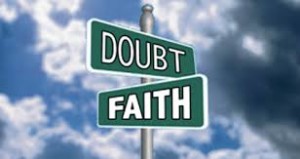 Thomas: the patron saint of honest doubters. I have always liked the guy. He was the only one of Jesus’ followers who had the nerve to say, “I’m not going to take your word for it. I have to see it.” I like him because I have always been gullible, and I admire him for not being so. On second thought, I am not so much gullible as unwilling to speak up when I have doubts. Thomas is who I want to be.
Thomas: the patron saint of honest doubters. I have always liked the guy. He was the only one of Jesus’ followers who had the nerve to say, “I’m not going to take your word for it. I have to see it.” I like him because I have always been gullible, and I admire him for not being so. On second thought, I am not so much gullible as unwilling to speak up when I have doubts. Thomas is who I want to be.
I read a book several years ago, Beyond Belief, written by Biblical scholar Elaine Pagals, that poses an interesting theory. Her research indicates that in the years following Jesus’ ministry there may have been a rift, a power struggle between John and Thomas. The two had different views on what it meant to be a follower of Jesus. Thomas’ writings teach that God’s light dwells within each one of us. We can know God through our own divinely given capacity and find the way for ourselves. John, in contrast, teaches that Jesus alone embodies the divine light and salvation is only possible through Christ.
Thomas emphasized our experience of God within us. John emphasized our beliefs about who Jesus was.
Pagels speculates that there was intense rivalry between various groups of disciples. Under intense pressure to unify the church around a clear set of doctrines of orthodox belief, the Council of Nicea in 325 AD included John’s gospel among the twenty-seven canonical books of the New Testament. All other books and divergent beliefs were suppressed.
Thomas’ writings were subsequently lost until they were discovered in 1947 among many other documents we know as the Dead Sea scrolls.
I find this historical theory fascinating. Why? For me, Thomas is the patron saint for those of us for whom doubt plays a vital role in faith, those of us who have questions and don’t want simplistic answers, those of us who are suspicious of militant certainty in matters of faith.
It affirms the many Thomases among us.
0 Comments until now
Add your Comment!